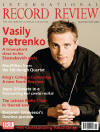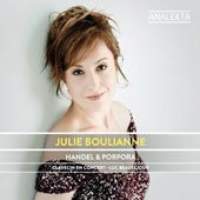Texte paru dans: / Appeared in:
*

International Record Review - (11//2014)
Pour
s'abonner / Subscription information
Analekta
AN28764

Code-barres / Barcode :
0774204876425
Consultez toutes les évaluations recensées pour ce cd
~~~~ Reach all the evaluations located for this CD
The presentation of this CD is poor. Texts of the arias are not included: one has to go to the company's website for just the Italian words. The short note is concerned only with the rivalry between Handel's Royal Academy of Music and Porpora's Opera of the Nobility, with no mention of the music or the content of the arias. How many of you know Porpora's compositions? Who decides such matters? In spite of there being many more suitable arias by Handel and over 40 operas by Porpora, this disc runs for only 56 minutes. Why?
The Handel items have been recorded quite often, especially the seemingly ubiquitous 'Ombra mai fu', in which the Canadian mezzo Julie Boulianne has many predecessors. In her operatic repertoire are Rossini's Rosina and Cenerentola, Mozart's Cherubino and Zerlina and Berlioz's Béatrice, Ascagne and Marguerite: the last of those I should have thought was too heavy for her, judging by those other roles and her voice as heard on the present CD.
I hoped that the singing here would be better than the presentation. It is. Beginning with 'Vaghi amori' from Porpora's La Festa d'Imeneo, I heard a lightish mezzo‑soprano of pleasing quality and ease of execution. Although there are upward and downward leaps in the closing stages, performed cleanly, this is not an aria of rapid tempo and dazzling dexterity but has an attractive melody. The other Porpora selections are from Polifemo, of which 'Alto giove' is an elegant, graceful and slow‑moving piece, in which Boulianne's breath control copes well with some long phr4ses. 'Dolci freschi aurette', the second extract from this 1753 opera, has a more tilting rhythm but again is not a swift aria d'agilita, though it is suited to the little trills that the singer provides. The low notes in her voice are barely used in any of the Porpora arias.
The remainder of this CD belongs to Handel, the longest of whose arias is 'Scherza infida', which takes 10'52". The accompaniment is delicately played and Boulianne shapes the piece with a gentle touch and a steady line, adding a few simple ornaments in the da capo. I should have liked a few to have been more embellished and a greater range of vocal colouring, but it is persuasively accomplished. Choosing my own playing order, I decided to listen to the slower arias first, though on the CD they are interspersed with the faster ones. I began with 'Ombra mai fu', to the recitative of which, 'Frondi tenere', Boulianne introduces a bigger sound, richer in the aria itself, darker in timbre but not turgidly delivered. Also from Serse is the contrasting 'Se bramate d'amar', in which swiftly‑moving lines alternate with slow ones. The fioritura poses no problems, for the voice is nimble enough to skip through any hurdles that it may come across.
Trumpets join the orchestra, blazing forth the opening measures of 'Stà nell'Ircana pietrosa tana , a glorious excerpt from Alcina. We can hear again how Boulianne is able to dispatch quick music. Her runs are clean and fluent, her tone full and unstinted but not forced, her colours varied well. She decorates the da capo section with plenteous adornments. She certainly does not disappoint me in one of my favourite Handel arias.
Finally there is another fast‑moving piece, 'Dopo notte'. Like 'Scherza infida', it is from Ariodante but unlike that aria it is set by Handel at a cracking pace, calling for much agility from the singer by way of speed rather than stunning roulades. Boulianne has the breath and the technique to propel it
excitingly along its course. As with the other contents of this disc it makes one regret that the 20 minutes that are not used on the CD could have been devoted to further arias by both composers. Though it is regrettable that there is a relatively meagre amount of music, at least each track contains singing, and enjoyable singing too, with fine support from the conductor/harpsichordist Luc Beauséjour and the rather strangely named Clavecin en Concert, 'whose mission is to promote the
music
written for the harpsichord as a solo instrument or as part of an
orchestra'. All is recorded in clear sound, rendering the internal aspects
of this CD far superior to the external ones.
Cliquez l'un ou l'autre
bouton pour découvrir bien d'autres critiques de CD
Click either button for many other reviews


